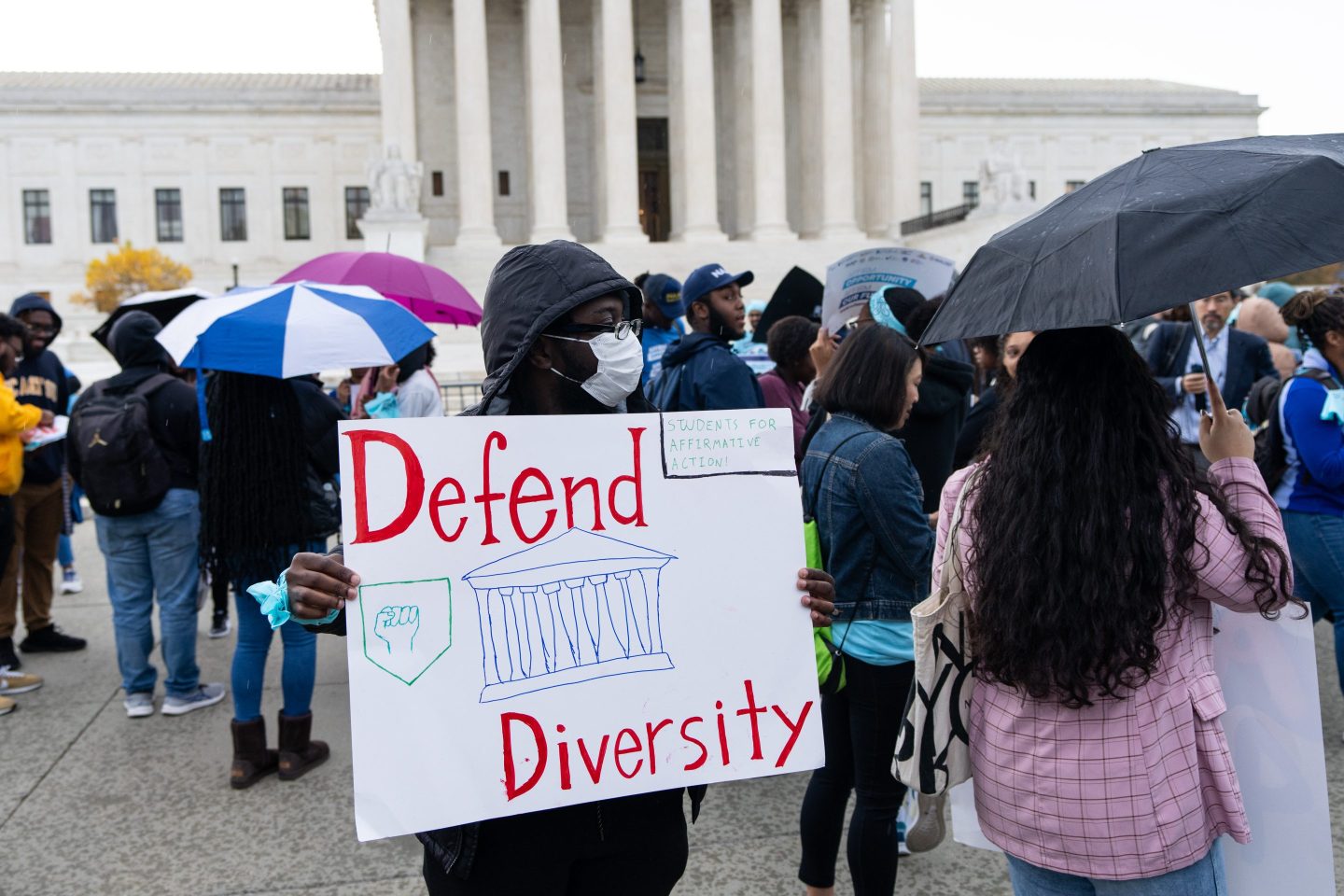Good morning!
Just six weeks have passed since the U.S. Supreme Court overturned affirmative action, striking down race-based decisions in college admissions. And the subsequent attack on corporate diversity programs that DEI experts feared would happen is unfolding faster than some expected.
In mid-July, 13 Republican attorneys general sent a letter to the CEOs of Fortune 100 companies warning that using race as a factor in hiring and employment practices could result in legal consequences and that the Supreme Court’s June decision could also apply to employers. Arkansas Sen. Tom Cotton (R) sent a similar letter to 51 major law firms later that month.
Just last week, the same group that brought the university affirmative action case to the Supreme Court sued the Atlanta-based Fearless Fund, a venture capital firm that backs Black women entrepreneurs, alleging racial discrimination. And already, companies like Amazon and Starbucks are facing lawsuits challenging their diversity programs, though these suits predate the Court’s decision.
Some employers are only now assessing what the high court’s decision could mean for their DEI initiatives and broader human capital strategy.
“It’s smart to get ahead of it before new litigation may be brought,” says Tina Shah Paikeday, the global head of Russell Reynolds Associates’ DEI practice. “Recognizing how fast this is moving will be important for companies playing in this space right now.”
Experts say HR leaders must work closely with legal counsel and be vigilant about how the company communicates diversity efforts internally.
“We really want to encourage HR departments to get accurate information from their attorney and [help] managers communicate to workers what their programs are, what they’re intended to accomplish, their goals, how they work in practice, and make sure that they comply with existing law,” says Katy Youker, director for the Economic Justice Project at the Lawyers’ Committee for Civil Rights Under Law.
Another option: Find out-of-the-box ways to support DEI initiatives. Russell Reynolds recommends its HR and DEI clients to focus on equity, or “providing opportunity and fairness for everyone, rather than focusing on diversity-related targets,” Paikeday says. Employers can also zero in on the business reasons for diversity programs, such as the benefits of diverse perspectives, creativity, or risk mitigation. But be prepared to address any complaints that arise.
“Weigh the potential risks that could be there for the programs you have in place and take very smart, defensive moves,” says Paikeday. “Whether it’s expanding those programs to be inclusive of a broader population of people [or] employee resource groups and making sure that they’re open to anyone of any background.”
One thing to avoid is backtracking on diversity commitments, which some employers have started to do. Preemptively undoing existing diversity commitments could carry legal ramifications, says Youker. The Supreme Court’s decision on affirmative action in June does not apply to employment civil rights law, and backstepping could expose employers to legal risk from minority groups who rely on corporate diversity initiatives.
“If you decide [to overcorrect] because there’s a very loud contingency saying that DEI needs to go away, you’re exposing yourself to much greater liability because you’re rejecting your existing obligations,” Youker says.
Paige McGlauflin
paige.mcglauflin@fortune.com
@paidion
Reporter's Notebook
The most compelling data, quotes, and insights from the field.
Job-hopping has become more common among Gen Z and younger millennial professionals. Twenty-two percent of workers over 20 spent a year or less at their jobs in 2022, the highest percentage since 2006, according to the Employee Benefit Research Institute.
The phenomenon is creating a headache for employers and HR teams. Seventy-seven percent of hiring managers named job-hopping their top concern when evaluating a candidate’s resume, according to a survey from HR consulting firm Robert Half. “Human resources executives keep hoping it will improve, but it just seems to get worse by the month,” Jeff Hyman, chief executive of Recruit Rockstars, tells the New York Times.
Around the Table
A round-up of the most important HR headlines.
- Beware of "loud laborers": employees who spend more time talking about their work and little time actually doing it. Insider
- Companies are offering sabbaticals to employees earlier to stave off burnout. PayPal and Adobe allow employees to take a paid month-long break after five years on the job. WorkLife
- At least 50 companies will now pay for alternative therapies, like ketamine and psilocybin therapy, for employees with mental health issues. Fast Company
Watercooler
Everything you need to know from Fortune.
Roe reverberates. Companies that promised to pay for abortion-related travel costs saw an uptick in job applications, new research finds. But their employees in typically male-dominated jobs viewed the company less favorably. —Irina Ivanova
Trash talking. Shawn Fain, president of the United Auto Workers union, took to Facebook Live this week and threw a wage hike offer from Stellantis (literally) in the trash. Fain criticized the proposed hike from the manufacturer of Jeeps as a “slap in the face” that fell below the 40% increase the union wants. —Nicholas Gordon
Retirement drain. A concerning share of employees are withdrawing funds from their 401(k) retirement funds due to financial constraints, Bank of America reports. Withdrawals classified as “hardship distributions,” made during personal economic stress, have risen 36% since last year. —Chloe Taylor
This is the web version of CHRO Daily, a newsletter focusing on helping HR executives navigate the needs of the workplace. Sign up to get it delivered free to your inbox.












